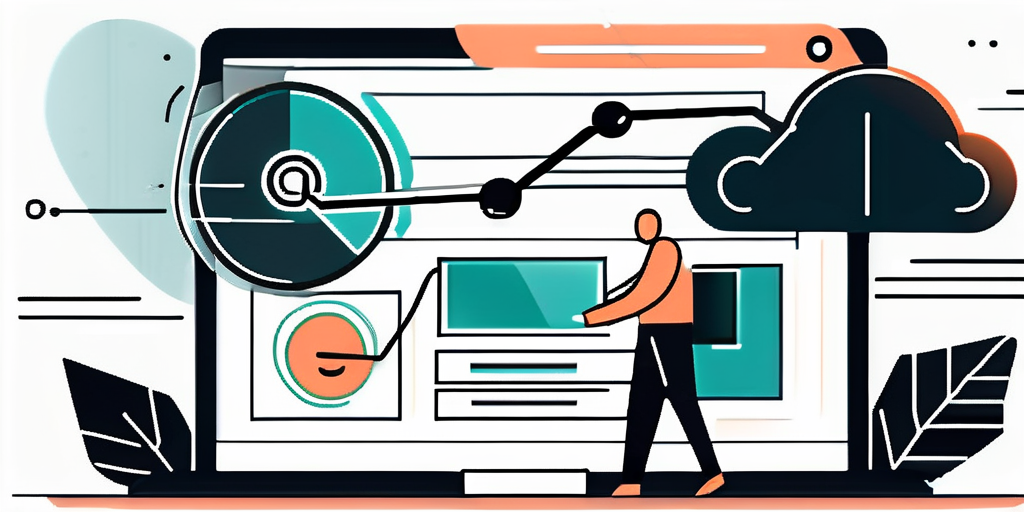In the digital age, the ability to attract, engage, and convert website visitors into leads is paramount for small businesses. The concept of ‘Website Leads’ is a critical component of online marketing strategies, and ‘Content Personalization’ plays a significant role in this process. This glossary article delves into the intricate details of these concepts, providing a comprehensive understanding of how they work in tandem to drive business growth.
Website leads are potential customers who have shown interest in your product or service by providing their contact information through your website. Content personalization, on the other hand, is the strategy of tailoring your website’s content to meet the specific needs and preferences of individual users, thereby enhancing their experience and increasing the likelihood of them becoming leads.
Understanding Website Leads
Website leads are the lifeblood of any online business. They represent potential customers who have shown a certain level of interest in your offerings. This interest is typically demonstrated by the visitor performing a specific action on your website, such as filling out a form, signing up for a newsletter, or making a purchase.

Leads are not just random website visitors; they are individuals who have been qualified in some way, indicating a higher likelihood of becoming customers compared to the average visitor. The process of qualifying leads involves collecting and analyzing data about the visitor’s behavior and engagement with your website and content.
The Importance of Website Leads
Website leads are crucial for businesses because they represent potential revenue. The more leads you generate, the more opportunities you have to convert those leads into paying customers. This is especially important for small businesses, where every customer counts.
Moreover, website leads provide valuable data about your target audience. By analyzing the behavior and preferences of your leads, you can gain insights that help you refine your marketing strategies, improve your offerings, and ultimately grow your business.
Types of Website Leads
Website leads can be categorized into several types based on their level of engagement and readiness to make a purchase. These include Information Qualified Leads (IQLs), who have shown interest in your content and provided their contact information in exchange for more information; Marketing Qualified Leads (MQLs), who have engaged with your marketing efforts and shown a higher level of interest; and Sales Qualified Leads (SQLs), who are ready to make a purchase.
Understanding these different types of leads and their unique needs and behaviors is crucial for developing effective lead nurturing strategies and moving them along the sales funnel.
Exploring Content Personalization
Content personalization is a marketing strategy that involves tailoring your website’s content to meet the specific needs and preferences of individual users. This is achieved by collecting and analyzing data about the user’s behavior, interests, and demographics, and using this information to present them with content that is most relevant and appealing to them.

Personalized content can take many forms, from personalized product recommendations and tailored email newsletters, to dynamic website content that changes based on the user’s behavior and preferences. The goal is to create a more engaging and satisfying user experience, which in turn increases the likelihood of conversion.
The Role of Content Personalization in Lead Generation
Content personalization plays a crucial role in lead generation by enhancing the user experience and increasing engagement. By presenting users with content that is relevant and appealing to them, you increase the likelihood of them engaging with your content and performing the desired actions, such as filling out a form or making a purchase.
Moreover, personalized content helps build trust and loyalty with your audience. When users feel that your content is tailored to their needs and interests, they are more likely to see your brand as a trusted advisor and develop a stronger relationship with your brand, increasing the likelihood of them becoming leads and eventually customers.
Implementing Content Personalization
Implementing content personalization involves several steps, starting with data collection. This involves tracking and analyzing user behavior on your website, as well as collecting demographic and psychographic data about your users. This data is then used to create user profiles or personas, which serve as the basis for personalizing content.
Once you have a clear understanding of your users and their needs and preferences, you can start creating personalized content. This involves tailoring your content to meet the specific needs and preferences of each user or user group, and presenting this content in a way that is most engaging and appealing to them.
Bringing It All Together: Content Personalization and Website Leads
Content personalization and website leads are two sides of the same coin. On one hand, content personalization enhances the user experience and increases engagement, which in turn increases the likelihood of visitors becoming leads. On the other hand, the data collected about leads can be used to further refine your content personalization efforts, creating a virtuous cycle of continuous improvement and growth.
By understanding and effectively leveraging these two concepts, small businesses can significantly enhance their online marketing efforts, attract more leads, and drive business growth. Whether you’re a small business owner, a marketer, or a web developer, understanding these concepts is crucial for success in the digital age.
Best Practices for Content Personalization and Lead Generation
When it comes to content personalization and lead generation, there are several best practices that can help you maximize your results. These include segmenting your audience based on their behavior and preferences, creating personalized content that meets the specific needs of each segment, and continuously testing and refining your strategies based on data and feedback.
Moreover, it’s important to ensure that your content personalization efforts are transparent and respect user privacy. This involves clearly communicating how and why you’re collecting and using data, providing users with options to control their data, and complying with all relevant privacy laws and regulations.
Tools and Technologies for Content Personalization and Lead Generation
There are numerous tools and technologies available that can help you implement content personalization and lead generation strategies. These include Customer Relationship Management (CRM) systems, which help you manage and analyze customer data; Content Management Systems (CMS), which allow you to create and manage personalized content; and marketing automation tools, which automate various aspects of the lead generation process.
Moreover, there are several advanced technologies, such as artificial intelligence (AI) and machine learning, that can help you take your content personalization and lead generation efforts to the next level. These technologies can help you analyze large amounts of data, predict user behavior, and deliver highly personalized content at scale.
Conclusion
Content personalization and website leads are critical components of online marketing strategies for small businesses. By understanding and effectively leveraging these concepts, businesses can enhance their user experience, increase engagement, generate more leads, and drive business growth.

Whether you’re just starting out or looking to refine your strategies, this glossary article provides a comprehensive understanding of these concepts and how they work in tandem to drive business success. Remember, the key to success is continuous learning, testing, and refinement.
Frequently Asked Questions
What is Content Personalization?
Content personalization is a strategy used by digital marketers to deliver customized content to users based on their characteristics, preferences, and behaviors. This can include tailoring the content on a website, email marketing campaigns, social media, and other digital platforms to meet the individual needs of each user. The goal is to create a more engaging and relevant experience for users, encouraging higher engagement rates, increased satisfaction, and improved conversion rates.
Why is Content Personalization important?
Content personalization is important because it:
- Enhances User Experience: By providing content that is relevant to the individual user’s interests and needs, businesses can improve the overall user experience.
- Increases Engagement: Personalized content is more likely to capture the user’s attention and keep them engaged with the brand.
- Improves Conversion Rates: Tailored content that meets users’ specific needs can guide them more effectively through the sales funnel, leading to higher conversion rates.
- Builds Customer Loyalty: Users who feel understood and valued through personalized experiences are more likely to remain loyal to a brand.
How can businesses implement Content Personalization?
Businesses can implement content personalization through several methods, including:
- Data Collection: Gathering data through user interactions, such as website visits, social media engagement, and purchase history.
- User Segmentation: Categorizing users based on demographics, behavior, and preferences to tailor content more effectively.
- Dynamic Content: Using technology to dynamically change the content displayed to a user based on their profile or behavior.
- A/B Testing: Continuously testing different content variations to see which performs best and refine personalization strategies.
What are the benefits of Content Personalization?
The benefits of content personalization include:
- Improved User Satisfaction: By providing content that is directly relevant to users’ interests, satisfaction levels can significantly increase.
- Higher Retention Rates: Personalized experiences can reduce bounce rates and keep users on the platform longer.
- Increased Relevance: Tailored content ensures that users see the information and offers that are most applicable to them, reducing noise.
- Enhanced Brand Perception: Brands that effectively personalize content are often seen as more customer-centric and innovative.
What challenges are associated with Content Personalization?
Challenges associated with content personalization include:
- Data Privacy: Balancing personalization with the need to respect user privacy and comply with regulations like GDPR.
- Data Integration: Integrating data from various sources to create a comprehensive view of each user can be complex.
- Resource Intensive: Developing and implementing a content personalization strategy requires significant resources, including technology and skilled personnel.
- Maintaining Accuracy: Ensuring that the data used for personalization is accurate and up-to-date to avoid irrelevant or incorrect content delivery.
Lead Engagement: Related Glossary Terms
Still unsure about Contact Button?
3 reasons to give it a try
- Start at no cost with our Basic Plan. We'll even help install your first button for free!
- Our all-in-one widget will make your website easier to use and help you capture more leads.
- All your existing website plugins, apps, and menus will still work after you install a Contact Button, so it can be easily removed if you no longer want it.
Basic Plan
Free
Good for websites with fewer than 1,000 visitors per month
- Up to 10 New Leads per Month
- Up to 100 Monthly Button Clicks
- Access to Premium Features
- Use Custom Google Fonts
- Hide Contact Button Branding
- Embed Your Own Affiliate Link
Max Plan
$5
/ month
Remove monthly limits and unlock premium features
- Unlimited Monthly Leads
- Unlimited Button Clicks
- Access to Premium Features
- Use Custom Google Fonts
- Hide Contact Button Branding
- Embed Your Own Affiliate Link